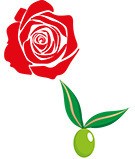ABOUT
Wind is one of the factors that influence the production of olives. The pollination of the olive flower takes place through the same flower or flowers of different cultivars. Cultivars that have their own characteristics. Features that give the oil its own identity. Identity that also varies according to the territory. Territory that shows us the signs of time. Time that passes slowly and requires a lot of patience to produce an oil that is valid for our well-being. Wellness that is often confused in this world. A world of olive growing that we would like to show you with our bottles. Bottles that have a little history. A story of a small fruit that produces a great product. Produced by small producers. Producers who are often not seen and to whom we will give a vision. The vision of an oil, often identified with the words Extra Virgin, is no longer sufficient to identify an olive oil. Olive Oil that we present to you in limited bottles that take their name from small details. Details that make the difference. Difference that we can recognize with our senses. Senses that guide us to recognize the right oil for our dishes. Dishes that will give us an emotion. An emotion that will satisfy the pleasure.
Naturally, someone will ask: “What cultivation technique is practiced in this company? Is it an organic company? Who guarantees this?” First, I would like to highlight that there is a difference between Production Certification and Quality Certification. Since June 30, 2016, our olive groves have been registered with the Oliva Di Gaeta POD. Furthermore, as of May 4, 2018, our production method has been certified Organic. The oil that we bottle, even if produced in larger quantities than our Limited Edition 179/179, is always subjected to sensory analysis by recognized and qualified laboratories. All in compliance with Annex XII of ECC regulation 2568/91 and subsequent amendments. At one time, olive groves were regulated with special rules. The entry of animals into the olive groves was allowed only in certain periods. Sheep, cows, and horses were able to graze and rest under olive trees in order to fertilize and clean the soil. Where possible, legumes were planted to release nitrogen and other natural minerals for fertilization. Today, we limit the transit of mechanical vehicles, and many jobs are done manually. Our trees tell us what they need, especially when they need to be pruned. As the old Roman agronomist Lucius Junius Moderatus Columella (4-70 AD) said: “pruning is the main agricultural practice to be carries out on the olive tree”. We accept our olive trees spontaneously give us. Therefore, we prefer to say that we have been following the Natural method for many years. The best certification recognized by us is the appreciation of the people who continue to request our products.
CATULLO MANCIOCCHI
Contrada Sant’Angelo, 25
04010 Cori
+39 333 721 2220
info@rosaetmeomeo.com
